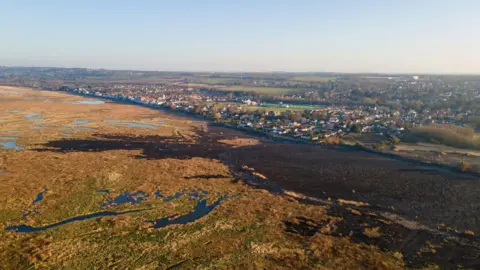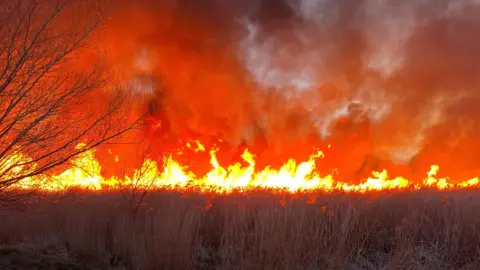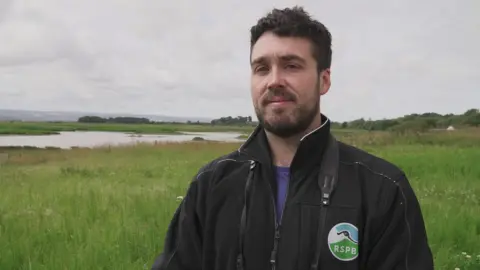'Nature bouncing back' after marshland fire - RSPB
 RSPB
RSPBMore than two years ago one of the "most important places in Europe" for wildlife was destroyed by fire.
A blaze, started deliberately, ripped through 10 hectares of the Neston reedbed marshland on the Wirral Peninsula in March 2022.
Three 15-year-old boys were handed nine-month referral orders for arson and damage of a site of special scientific interest last year.
The RSPB has said "nature is bouncing back" as they announced new measures to prevent future fires and anti-social behaviour.
'Heart sank'
The Dee Estuary nature reserve is home to a "huge variety of birds" and is an important place for conservation, Cheshire Wildlife Trust said.
But the fire, which "blazed for hours", destroyed a well-established reedbed and saltmarsh which was an important habitat for endangered birds like the hen harrier, songbirds and bittern, Natural England said.
Dan Trotman, visitor operations manager for the RSPB Dee Estuary reserve, said his "heart sank" when he saw the smoke.
"I knew immediately where it was coming from because sadly this is the third time that this reedbed has been burnt in my time working here," he added.
 RSPB
RSPBFive months after the fire, the RSPB said it could take two years for wildlife to recover.
However, Mr Trotman said the reedbed has "recovered well" with two years of re-growth.
"Marsh harriers nested here last year and this year so nature is bouncing back but it will take a couple of years until the reedbed is dense and as tall as it was prior to the fire," he said.
It comes as the RSPB and Cheshire Wildlife Trust announced new measures to help more people enjoy the area while also being "respectful" to the local wildlife.
The measures include a channel of wet barriers that run through the reedbed and a new coastal path named after King Charles.
 RSPB
RSPBHannah Phillips, programme manager for rivers and wetlands at Cheshire Wildlife Trust, said the wet barriers had created areas of open water for wildlife and enabled breaks through the bed, reducing the accessibility so that wildlife are less disturbed.
The new walkway through Neston and the nature reserve forms part of the England Coastal Path and was established with funding from the Department for Environment, Food and Rural Affairs (Defra).
Mr Trotman said the path, which links the paved areas of Parkgate village to the pre-existing Burton Marsh Greenway at Little Neston, had been upgraded with a fully-accessible surface which he said he hoped would deter possible arsonists.
He said: "The new path will attract new people to the area which you may think is a negative thing for such a sensitive habitat but actually the majority of those people will be respectful of the nature and the habitats.
"They will keep to the path and that will be a deterrent of misbehaviour and hopefully deter future fires."
Listen to the best of BBC Radio Merseyside on Sounds and follow BBC Merseyside on Facebook, X, and Instagram. You can also send story ideas to [email protected]
